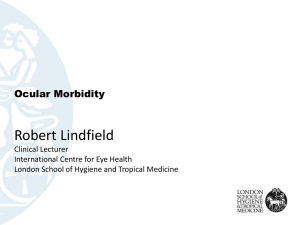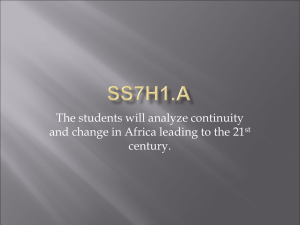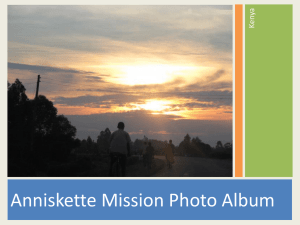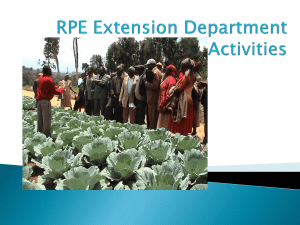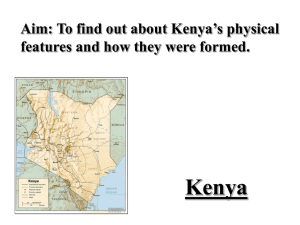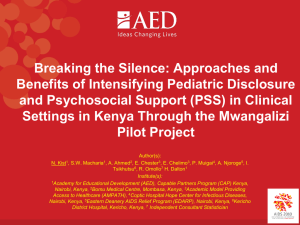The Politics of Knowledge in Africa and the Role of research and
advertisement
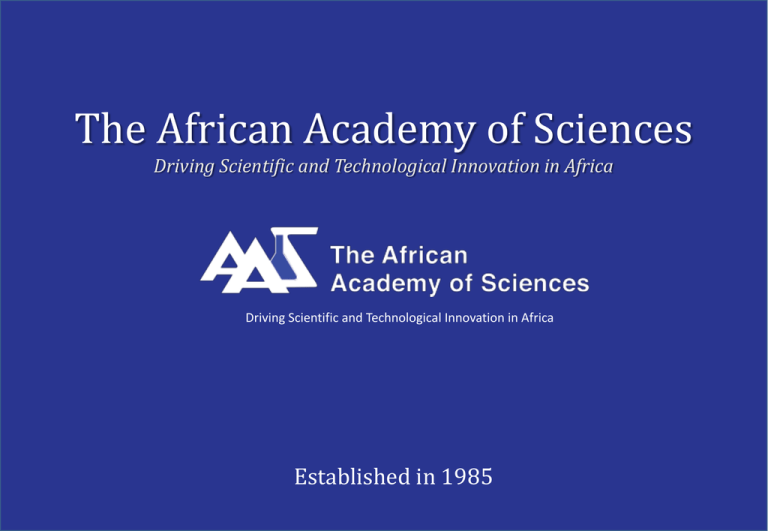
The African Academy of Sciences Driving Scientific and Technological Innovation in Africa Driving Scientific and Technological Innovation in Africa Established in 1985 The African Academy of Sciences Driving Scientific and Technological Innovation in Africa The Politics of Knowledge in Africa and the Role of research and Evidence in Policy making. By: Benji Apraku Gyampoh, PhD b.gyampoh@aasciences.org; @AASciences Think Tank Initiative Learning Events in Africa, 19 May 2014, Nairobi, Kenya Presentation Outline • • • • • • Introduction The Politics of Knowledge in Africa Role of research in policy making Some lessons learnt Suggestions for capacity building Conclusions Think Tank Initiative Learning Events in Africa, 19 May 2014, Nairobi, Kenya “We shall accumulate machinery and establish steel works, iron foundries and factories; we shall link the various states of our Continent with communications; we shall astound the world with our hydroelectric power; we shall drain marshes and swamps, clear infested areas, feed the undernourished, and rid our people of parasites and disease. It is within the possibility of science and technology to make even the Sahara bloom into a vast field with verdant vegetation for agricultural and industrial developments”. President Kwame Nkrumah, first speech at the foundation summit of the Organization of African Union, Addis Ababa, 24 May 1963 Think Tank Initiative Learning Events in Africa, 19 May 2014, Nairobi, Kenya Introduction • How would Africa implement Nkrumah’s vision? • What is needed? – The right policies – The right infrastructure • What will inform these policies? – Quality and Relevant Research Evidence? Think Tank Initiative Learning Events in Africa, 19 May 2014, Nairobi, Kenya The Politics of Knowledge in Africa – Lagos Plan of Action for the Economic Development of Africa, 1980–2000; 1980 • Following The Monrovia Declaration, 1979 ,to hold of an Extraordinary Session to consider economic problems facing Africa; • African governments should commit 1% GDP to R&D – Africa’s Science and Technology Consolidated Plan of Action (CPA); adopted by African ministers of S&T in 2005; endorsed by AU heads of state and government in 2006 • Establishment of AOSTI, ASTII – Addis Ababa Declaration on Science Technology and Scientific Research for Development, 2007 – Nairobi ministerial declaration, 2012 • STI for youth Employment , Human capital Development and Inclusive Growth. Think Tank Initiative Learning Events in Africa, 19 May 2014, Nairobi, Kenya Now comes STISA • Science, Technology and Innovation Strategy for Africa (STISA), 2014 – 2024. Three legal instruments to help with implementation: – The African Observatory of Science, Technology and Innovation (AOSTI) for monitoring and evaluation; – The Pan-African Intellectual Property Organisation (PAIPO) for safeguarding intellectual property rights – The African Scientific Research and Innovation Council (ASRIC) as an umbrella organisation of academics from all AU member states to mobilise the day-to-day management of the STISA implementation and provide a link between continental and national implementation Think Tank Initiative Learning Events in Africa, 19 May 2014, Nairobi, Kenya Science Academies in AFRICA • About 20 science academies in Africa – Including the African Academy of Sciences (AAS) • General Roles – The scientific eyes of the society – Provide impartial, credible, science and technology-based assessments of issues – Guide policy makers in making informed decisions in science and technology for sustainable development • NB: Close enough to government to work with it but far enough not to lose its ability to think professionally and independently Think Tank Initiative Learning Events in Africa, 19 May 2014, Nairobi, Kenya The African Academy of Sciences Vision To be a MAJOR player in driving sustainable development in Africa through Science, Technology and Innovation (ST&I) Mission To mobilize the entire African science and technology community for sustainable development Think Tank Initiative Learning Events in Africa, 19 May 2014, Nairobi, Kenya Africa’s Agenda 2063 “An Integrated, prosperous and peaceful Africa, driven by its own citizens and representing a dynamic force in the global arena” • Surely, things must be done differently to take advantage of the current momentum towards 2063 Think Tank Initiative Learning Events in Africa, 19 May 2014, Nairobi, Kenya Role of Research in Policy Making Poverty Health Population growth and Urbanization Productivity The threats of climate change Think Tank Initiative Learning Events in Africa, 19 May 2014, Nairobi, Kenya Role of research in policy making Reducing Poverty “Sustaining Africa’s strong growth over the longer term while significantly reducing poverty and strengthening people’s resilience to adversity Enablers • Boost in Agricultural production and food security • Comprehensive Africa Agriculture Development Programme (CAADP) Role of Research • • • • • • Developing improved crop varieties Better Farming Practices; mechanisation Commodities diversification Pest and disease management Providing access to safe drinking water Improved data management; statistical capacity to better track changes • Biotechnology • Translating growth into poverty reduction • Demonstrating quality with relevance Think Tank Initiative Learning Events in Africa, 19 May 2014, Nairobi, Kenya Role of research in policy making Better health Addressing the challenge of a double burden of communicable and non-communicable diseases over the next 50 years. AfDB, 2013 Enablers • • • • Improved healthcare Safe drinking water Improved sanitation Improved nutritional wellbeing Role of Research • • • • • • • • • Think Tank Initiative Learning Events in Africa, 19 May 2014, Nairobi, Kenya Combating HIV/AIDS, Malaria, NCDs, etc Providing safe water Developing new vaccines and medicines Addressing increasing rate of noncommunicable diseases Training of human resources Developing health infrastructure Innovation in healthcare delivery: e-health Improved nutrition Addressing Impact of climate change on health Role of research in policy making Controlling Population Growth and Improve Urbanisation “Sustaining Africa’s strong growth over the longer term while controlling our population and ensuring improved urbanisation Enablers • Right Policies • Education • Appropriate infrastructure Role of Research • Addressing rapid uncontrolled urbanization • Affordable housing and urban planning • Provision of adequate sanitation, water and healthcare facilities, • Environmental, physical and societal challenges related to planning settlements • Engineering: design of roads and bridges, water and sewer systems • Telecommunications networks Think Tank Initiative Learning Events in Africa, 19 May 2014, Nairobi, Kenya Role of research in policy making Increased Productivity “Sustaining Africa’s strong growth over the longer term by increasing productivity and reducing all factors that limit productivity Enablers • Right Policies • Relevant research • Increasing energy production • Efficient energy use Role of Research • • • • Technology for developing energy resources Impact of diseases on productivity Measures to raise productivity industry Reducing losses due to Malaria incapacitated labor; estimated to be $12 billion annually • Increased technology use and innovation • Improving skills and institutional capacity to support productivity Think Tank Initiative Learning Events in Africa, 19 May 2014, Nairobi, Kenya Role of research in policy making Addressing the impacts of climate change “Sustaining Africa’s strong growth over the longer term in the face of changing climate and increased climatic variability and its impacts Enablers • Improved understanding of the impact of climate change • Right Policies Role of Research • • • • Improved understanding of climate change Adaptation studies: opportunities, risks Rainwater harvesting technologies Technology for sound environmental management • Developing low emission technology • Capacity to control imports and exports of wastes into and within Africa. • Developing adaptation and mitigation strategies Think Tank Initiative Learning Events in Africa, 19 May 2014, Nairobi, Kenya Some Lessons Learnt Think Tank Initiative Learning Events in Africa, 19 May 2014, Nairobi, Kenya Scientific Output in the Africa Union • Relatively small (at around 2% of the world total), but growing rapidly, with a growth rate similar to that of India, China and Brazil between 2005 and 2010. • How infrequently African countries collaborate—only 4.3% of the papers in 2008-2010 included intra-African collaboration, contrasting with a score of 40% for extra-African collaboration between at least one African and one non-African country. • Overall, the trend of science and technology improvement in the African Union is quite promising Think Tank Initiative Learning Events in Africa, 19 May 2014, Nairobi, Kenya Growth of African scientific output, 20052010 (1) Very tangible growth observed everywhere in Africa % Increase Country / Group 2005-2010 2005-2007 2008-2010 World 10,055,974 4,619,523 5,436,451 18% 1.00 African Union 181,454 74,629 106,825 43% 1.22 Community of Sahelo-Saharan States 108,575 43,507 65,068 50% 1.27 South African Development Community 61,778 27,006 34,772 29% 1.09 Common Market for Eastern and Southern Africa 60,239 24,357 35,882 47% 1.25 Arab Maghreb Union 42,836 16,461 26,375 60% 1.36 Economic Community of West African States 32,456 13,117 19,339 47% 1.25 Intergovernmental Authority on Development 15,237 6,248 8,989 44% 1.22 East African Community 13,688 5,759 7,929 38% 1.17 5,239 2,343 2,896 24% 1.05 Economic Community of Central African States 2008-2010 / 2005-2007 Source: Computed by Science-Metrix using the Scopus database (Elsevier) Think Tank Initiative Learning Events in Africa, 19 May 2014, Nairobi, Kenya Growth Index Growth of African scientific output, 20052010 (2) Cumulative growth is similar to that of fastest growing countries Cumulative growth 100% 90% India 80% China 70% Brazil 60% African Union 50% Rep. of Korea Australia 40% Spain 30% Netherlands 20% Switzerland 10% Italy 0% 2005 2006 2007 2008 2009 Year Source: Computed by Science-Metrix using the Scopus database (Elsevier) Think Tank Initiative Learning Events in Africa, 19 May 2014, Nairobi, Kenya 2010 What needs extra effort? • How to link science, technology and innovation to poverty reduction, job creation, sustainable livelihoods and the improved well-being of citizens. • As countries engage in knowledge intensive activities, how will Africa expand its knowledge? • Supporting prudent policy formulation and research agenda that addresses economic and social challenges. • How to develop relevant STI indicators that can be used in formulating policies • Building quality and relevant capacity and competencies to ensure development of research-based policies Suggestions for Capacity Building Exploring new partnerships and mechanisms for supporting integrated trans-disciplinary research and capacity building activities Think Tank Initiative Learning Events in Africa, 19 May 2014, Nairobi, Kenya Suggestions for Capacity Building • Sustainable capacity building is a long-term intervention – Do a major audit of the capacity developing establishments such as higher educational and research establishments - to ensure that they are producing the specialized knowledge and skills needed for the continent’s development. • CIRCLE - Climate Impact Research Capacity and Leadership Enhancement – AAS, ACU, DFID collaboration – ca 100 research fellowship in trans-disciplinary fields. – An intra-African collaboration of early career African scholars and various home and host institutions Think Tank Initiative Learning Events in Africa, 19 May 2014, Nairobi, Kenya Suggestions for Capacity Building • Developing intra-African cooperation – collaboration between African and North scientists resulting in papers published in high impact factor journals is important – A real measure of capacity building for the African collaborators must take into consideration an appreciation of researches and publications where the Africans are leaders and not followers – Africa based researchers who are global leaders must be supported to promote trans-national collaboration in Africa Think Tank Initiative Learning Events in Africa, 19 May 2014, Nairobi, Kenya Suggestions for Capacity Building • The challenge of poverty in numbers, data and information – Training (both short and long term) of more personnel per country to create a critical mass of experts to undertake surveys – Institutionalise R&D surveys and innovation surveys, creating a culture of collecting and archiving statistics, and especially STI statistics, at national level. – Encourage dialogue among countries to share best practices – Encourage regular interaction between scientists and policy makers – Research data must be translated into easily comprehensible information for effective dissemination Think Tank Initiative Learning Events in Africa, 19 May 2014, Nairobi, Kenya Suggestions for Capacity Building • Inspiring and stimulating African youth – Africa is the most youthful continent with more than 50% of its population under 25 years of Age. – It is estimated that by 2040 Africa will have the largest and the youngest global workforce. – More initiatives needed that are targeted to inspire and stimulate the youth to be involved in quality and relevant research that breeds .innovation Think Tank Initiative Learning Events in Africa, 19 May 2014, Nairobi, Kenya Conclusions • Research finding its way into influencing policies is a science and an art. It is not an event but a long term intervention that needs careful planning, resourcing and strategizing • Quality and Relevant Research is what can influence policy. • Research uptake must be part of every research design and possible uptake stakeholders involved from the onset Think Tank Initiative Learning Events in Africa, 19 May 2014, Nairobi, Kenya Thank you Think Tank Initiative Learning Events in Africa, 19 May 2014, Nairobi, Kenya
